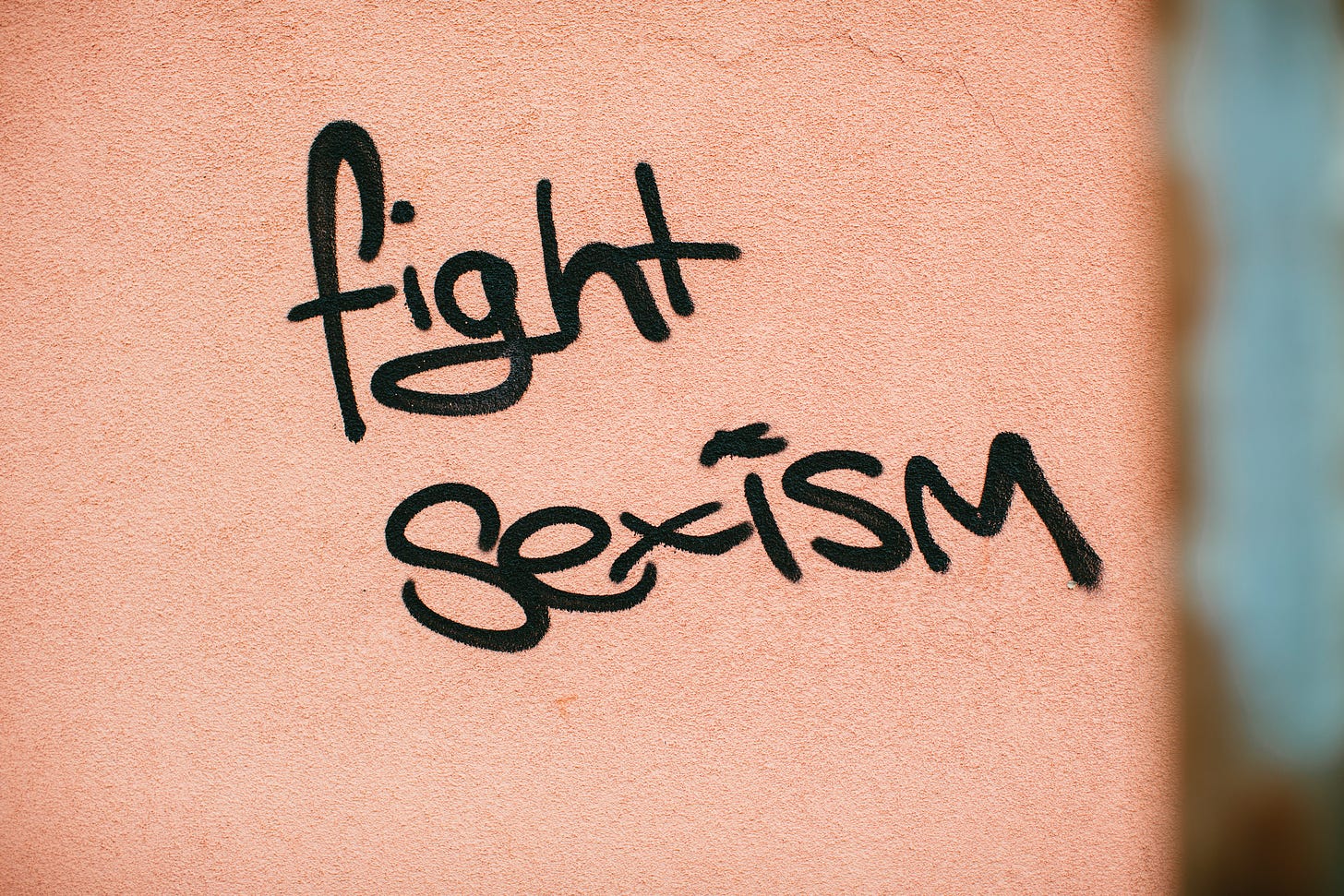

Discover more from Liberating Motherhood
Why do women blame other women for abuse?
Victim-blaming among women is one of patriarchy's most important and effective tools
A few months ago, in an online mothers’ group, a woman shared the story of a fight with her husband. In a moment of anger, she poked him. He responded by throwing her across the room, into a counter, and breaking two ribs. He remained remorseless as she sought emergency care, instead doubling down on his abuse and telling her she was playing the victim.
She came to the group asking what to do. The overwhelming response?
She started it, and she deserved it.
Because in a patriarchy, if a woman does anything bad at all, it warrants anything a man might do in response. Good women, in this framework, don’t deserve abuse, but bad women provoke men and deserve whatever happens to them—and in a patriarchy, there are no truly good women because the standards we must live up to are impossible.
I’m haunted daily by the story, because this woman sough help, and was denied even the most basic human decency. I’m certain he’s still abusing her, and certain she won’t seek help again.
These were progressive, liberal moms who no doubt had a lifetime of exposure to anti-violence messages. Still, when it really counted, they sided with the patriarchy. What’s going on here? Why are women so often eager to carry water for the patriarchy?
Friends, families, and communities play an important role in convincing women to stay in exploitative relationships. Often, a woman finally realizes things are unfair, only to find that no one in her life supports her decision to demand better. Gaslighting Inequality is my series on the ways society gaslights women about their relationships. You can find the rest of the series here.
This gaslighting among women is more than a passing negative comment or hurt feelings. It is one of patriarchy’s most important tools. Because if women seeking safety from men cannot rely on other women, who can they turn to?
Precisely no one.
Victim-blaming to attain a sense of safety
People who blame victims desperately want to believe in a just world. Rather than working to actively make the world we have just, though, they instead assume at its outset that the world is just.
This is the core of most victim-blaming, according to almost all academic research on the topic.
This belief that the world is just helps a person feel safe in their own world. “I would never do that thing, so this would never happen to me,” she tells herself. The more aggressively she blames the victim, the easier it becomes for her to believe that the world is a fair place where she can remain safe.
No one wants to believe that men can just become abusive, that terrible things happen to good people, and that there’s nothing you can do to fully protect yourself in this scary and unjust world. So they turn to victim blaming to separate themselves from the very people who most need their empathy.
Justifying one’s own experiences
However you define it, most men are not good partners—and even according to conservative estimates, at least 1 in 5 men has attacked a partner. Thirty-two percent of men say they would force a partner to have sex (the legal definition of rape), and 14% say they would rape a partner (using that term). These figures account only for the men who admit to such behaviors. And as any woman in a relationship knows, getting a man to admit to any form of abuse is not easy.
Mistreatment of women is normal in heterosexual relationships, especially when we add in emotional abuse, infidelity, and exploiting a partner’s labor. Women want to believe that their partners are good guys, that their marriages are happy, that they are safe.
So they look to blame the victim as a way to avoid blaming men. It’s not that he exploits her labor; it’s that she doesn’t communicate her needs. It’s not that he sexually coerces her; it’s that she withholds sex. It’s not that he attacked her; it’s that he was defending himself. If there are things women can do to avoid mistreatment, then there’s hope for her marriage and her safety.
Unthinkingly repeating what patriarchy has taught
Patriarchy offers us many thought-disrupting cliches, such as the notion that a woman who hits a man should expect to get hit back. That’s equality, you see, and all other forms of equality just don’t matter.
Patriarchy works by indoctrinating us from birth. Women are not immune. We learn to distrust and judge other women, to seek male approval, to fear men’s violence while simultaneously normalizing men’s violence as somehow just and reasonable.
People who have not actively, aggressively, and on an ongoing basis thought critically about what patriarchy has taught them will replicate its messages—even if they identify as liberals, progressives, or leftists. Perhaps especially then, since they’ll mistakenly view themselves as immune to misogyny.
Fake empathy and therapy speak
At its core, victim blaming is a failure to empathize with the victim—to see her as fundamentally human, as like us, as someone who matters, as someone who can suffer if we hurt her.
Instead, what often happens—especially in online circles—is that every empathizes with the perpetrator. This is where you’ll often see therapy speak weaponized. “I can see his behavior has brought up a lot for you, but what about him?”
It can become a competition to see who can come up with the best theory to justify and explain his behavior. Then folks pat themselves on the back for their ability to empathize and understand, all while ignoring the suffering human in front of them.
Cozying up to power
Particularly among white, or otherwise privileged, women, siding with the oppressor is a way to cozy up to power. My friend Desiree Stephens, a brilliant racial justice educator, has done a lot of work on this subject.
She argues that this is a way to seize some power for oneself, at the expense of your fellow woman. There’s a long and rich tradition of this behavior in white feminism: the enslaver’s wife blaming an enslaved woman for her own rape rather than joining forces with the victim against their mutual abuser; well-off white women mistreating their Black and brown nannies rather than joining with them in solidarity to ensure women’s work is valued; white women protesting de-segregation to curry favor with powerful men rather than understanding that their interests are more aligned with oppressed groups, and that together, they could build a better world.
This is more of that. When women come together across race, class, and ability to fight back against oppression, we are unstoppable. We are the majority. Instead, we allow white supremacist capitalist patriarchy to divide us. We speak out only when something directly affects us, allow petty disputes to divide and degrade the movement, and refuse to play the long game.
It’s been going on for centuries now, but we can stop it.
Subscribe to Liberating Motherhood
For mothers who are pissed off about sexism, household chore inequality, and endless misogynistic bullshit, and for the allies who want a better world for all of us.
















Spot on, as usual. I recently shared in an online support group for women considering whether to leave their partners how overwhelmed I am and wondering how I’m going to manage to take care of my two kids full time, continue to work full time as I always have, and provide spousal support for my STBX husband who has been a stay-at-home-dad (but carried none of the mental load while I’ve always been the default parent) because we’re planning to separate and he’s choosing to move 3,000 miles away from us and not provide any form of child support. The overwhelming response: that I’m cold and heartless for discarding him. Yet when it’s a SAHM facing divorce, all the advice is to lawyer up so she can keep the house, get maximum spousal support, and ensure regular and adequate child support. I am quite bitter about the whole situation, with my only consolation being that despite how much it’s going to suck financially, at least my kids and I will be free of the abuse and this cycle stops with me.
I firmly believe that women of European descent are saddled with epigenetic memory, specifically of the Burning Times. The Burning Times can be thought of as the longest-running and most successful eugenics project in human history: men selectively eliminated women whose survival instinct defaulted to fight, then they targeted women whose default survival instinct defaulted to flight - such that the only women left alive to have daughters were those who defaulted to either freeze (play dead) or appease.
After all, this is exactly how humans domesticated the mighty aurochs to become cattle nine thousand years ago on those very same Eurasian plains: by selectively breeding especially females for docility (and eliminating any animals that were too difficult to tame.)
If I'm right, this epigenetic memory would almost certainly play an outsize role in the propensity of women of European descent to side with the patriarchy against other women.
Not suggesting women of European descent should be let off the hook, but rather - if I'm right - this would change how we address the concern.